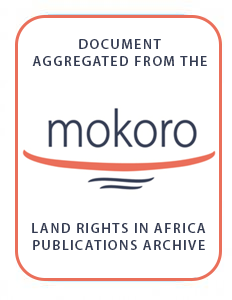Location
Mokoro is pleased to host the ’Land Rights in Africa’ site as a contribution to the land rights dialogue and related debates. This website was created in January 2000 by Robin Palmer, and was originally housed by Oxfam GB, where Robin worked as a Land Rights Adviser. A library of resources on land rights in Africa – with a particular focus on women’s land rights and on the impact of land grabbing in Africa – the portal has been well received by practitioners, researchers and policy makers, and has grown considerably over the years. Since 2012, Mokoro has been hosting and maintaining the site.
The views expressed on the Land Rights in Africa site as well as the publications hosted there, are those of the authors and do not represent those of Mokoro. Wherever possible, we link to the source website of publications.
Members:
Resources
Displaying 136 - 140 of 1134Land grabbing in Angola – a growing threat
A video showing how Lutheran World Federation is working with rural communities, village chiefs, local and national administration to raise awareness and to support people in claiming their legal rights in a context in which a land law was passed to protect small-scale farmers and rural communities but often the legal procedure is not respected and farmers lose the land on which their livelihood depends.
It’s time to end land grabs and establish food sovereignty in Gambela
Includes the indigenous peoples of Ethiopia; Ethiopia’s dire context; food insecurity; land grabs, conflicts and food security; development by displacement I: Ethiopia’s land investment policies; table of land deals with foreign companies in Gambela since 2007; development by displacement II: Ethiopia’s villagization programme; Voluntary Guidelines; time to close the door on land grabbing in Gambela. Concludes that it is time for change.
Kenya Land Issuance. Disaggregated Data Analysis
Kenya Land Alliance (KLA) disaggregated and analysed 1,000,099 out of about 3,200,000 title deeds issued by the Government of Kenya from 2013-17. The booklet reveals that women only got 103,043 titles representing 10.3%, while men got 865,095 titles representing 86.5% of the total. The data sampled shows that out of 10,129,704 hectares of land titled between 2013-17 women got 163,253 hectares representing a paltry 1.62%, while men got 9,903,304 hectares representing 97.76%.
Reconfiguring rural authority after land reform
Explores the reconfiguration of rural authority in the aftermath of Zimbabwe’s Fast Track Land Reform Programme, particularly the way chiefs were able to deploy ancestral autochthony as a way of contesting state hegemony. Argues that chiefs cannot simply be viewed as undemocratic remnants of colonial rule; instead, a nuanced understanding of their role in rural governance is required.
Responding to land-based conflict in Ethiopia: The land rights of ethnic minorities under federalism
Argues that the institutionalization of ethnic federalism and the persistence of neo-customary tenure result in considerable ambiguity, particularly regarding the land rights of non-indigenous minorities. Highlights tensions between these three sets of land tenure institutions – state ownership, ethnic federalism and neo-customary tenure – and their implications for minority land rights.




